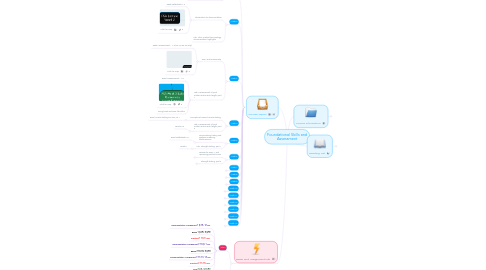
1. Course Topics
1.1. Week 1
1.1.1. Introduction
1.1.2. The clinical decision making process
1.2. Week 2
1.2.1. Introduction to documentation
1.2.1.1. Read Kettenbach 1-4
1.2.1.2. Click for map
1.2.2. Lab: Intro, medical terminology, documentation highlights
1.3. Week 3
1.3.1. ROM and Goniometry
1.3.1.1. Read Measurement... 1-3 (on 3 p 39-42 only)
1.3.1.2. Click for map
1.3.2. Lab: Measurement of joint motion and muscle length: part 1
1.3.2.1. Read Measurement... 4-7
1.3.2.2. Click for map
1.3.2.3. Bring book and wear lab attire
1.4. Week 4
1.4.1. Principles of manual muscle testing
1.4.1.1. Read Muscle testing xvii-xviii; ch. 1
1.4.2. Lab: Measurement of joint motion and muscle length: part 2
1.4.2.1. Read 8-12
1.5. Week 5
1.5.1. Documenting history and systems screening, test/measures
1.5.1.1. Read Kettenbach 5-7
1.5.2. Lab: Strength testing: part 1
1.5.2.1. Read 5
1.6. Week 6
1.6.1. Review for exam 1 and upcoming practical exam
1.6.1.1. Case studies in goniometry and mmt
1.6.2. Strength testing: part 2
1.6.2.1. Read 3-6
1.7. Week 7
1.7.1. Creating a safe environment for the patient and therapist Body mechanics Safe patient handling
1.7.1.1. Read mobility in context p. 58-59; 377-382
1.7.2. Lab: Review
1.8. Week 8
1.8.1. Draping and positioning General ROM exercises
1.8.1.1. Read mobility... 6,7, and 9
1.8.2. Practical exam 1
1.8.2.1. Covering goniometry and mmt
1.8.2.2. During normal lab time
1.9. Week 9
1.9.1. Assessment of mobility Bed mobility, transfers, and gait
1.9.1.1. Read Mobility...8,10-12,14
1.9.1.2. Handouts
1.9.2. Lab: Draping, positioning, ROM and body mechanics
1.9.2.1. Bring mobility in context
1.10. Week 10
1.10.1. No class-job fair
1.10.2. Lab: Bed mobility and transfers
1.11. Week 11
1.11.1. Assessment of posture Assessment of balance
1.11.2. Gait and assistive devices
1.12. Week 12
1.12.1. Assessing cognition and attention Review rubric for upcoming practical
1.12.2. Lab: Posture and balance
1.13. Week 13
1.13.1. Putting it all together-completing the general assessment
1.13.2. Lab: Putting it all together
1.14. Week 14
1.14.1. No class or Lab-Thanksgiving
1.15. Week 15
1.15.1. Finish outstanding material and review for final exam
2. Exam and Assignment Info
2.1. When
2.1.1. Documentation Assignment 1 9/18; 12 pm
2.1.2. Exam 1 9/25; 8-9:50
2.1.3. Practical 1 10/7; NLT
2.1.4. Documentation Assignment 2 10/9; 1 pm
2.1.5. Exam 2 10/30; 8-9:50
2.1.6. Documentation Assignment 3 11/13; 12 pm
2.1.7. Practical 2 11/18; NLT
2.1.8. Final 12/8; 9-10:50
2.2. Don't forget to...
3. Course Information
3.1. Title & Short Description
3.1.1. AHPT 8301 Foundational Skills and Assessment
3.1.2. This course presents foundational tests and measures necessary for the physical therapy examination. Using didactic lecture and clinical laboratory practice, foundational physical therapy skills and assessments are covered including but not limited to: goniometry, manual muscle testing, postural assessment, balance assessment, gait assessment as it relates to gait training, use of assistive devices, transfer training, and general positioning and draping.
3.2. Teacher
3.2.1. Lecture
3.2.1.1. Co-Course Coordinator, Lab Coordinator, and Amarillo Lab instructor: Misty Miller, PT, DPT Assistant Professor & Asst. DCE, DPT Program - TTUHSC Office: Amarillo Campus - 4907 Phone: 806-414-9688 Email: misty.miller@ttuhsc.edu
3.2.1.2. Co-Course Coordinator and Odessa Lab instructor: Tamra Bullard, PT, DPT Assistant Professor and Asst. DCE, DPT Program - TTUHSC Office: Odessa Campus – 2C60 Phone: 432-703-5173 Email: tamra.bullard@ttuhsc.edu
3.2.2. Lab
3.2.2.1. Additional Lab Instructors: Odessa: Deborah York, PT, MPT Assistant Professor, DPT Program – TTUHSC Office: Odessa Campus – 2C60J Phone: 432-703-5174 Email: deborah.york@ttushsc.edu
3.3. When & Where
3.3.1. Lecture: Tuesday 1-2:50 Lab: Wednesday 1-4:50
3.3.2. Lbk B
3.4. Grading System
3.4.1. 2 exams: 20%
3.4.2. Final exam: 15%
3.4.3. Documentation assignments: 10%
3.4.4. Medical terminology quizzes: 10%
3.4.5. In-class assignments: 5%
3.5. Online Resources
3.5.1. E-learning
3.5.2. Student forum
4. Reading List
4.1. Primary literature
4.1.1. . Hislop, H. J., Avers D, & Brown M. Daniel’s and Worthingham’s Muscle Testing: Techniques of Manual Examination, 9th ed. St. Louis: Saunders. ISBN: 978-1-4557-0615-0.
4.1.2. Johansson C, Chinworth SA. Mobility in Context: Principles of Patient Care Skills. Philadelphia: F.A. Davis. ISBN: 978-0-8036-1527-4.
4.1.3. Norkin CC, White DJ. Measurement of Joint Motion: A Guide to Goniometry, 4th ed. Philadelphia, PA: FA Davis; 2009. ISBN 978-0-8036-2066-7.
4.1.4. Kettenbach, G. Writing Patient/Client Notes: Ensuring Accuracy in Documentation, 4th ed. Philadelphia, PA: FA Davis; 2009. ISBN 978-0-8036-1878-7.
4.1.5. Gylys, B. A. & Wedding, M.E. Medical Terminology Systems – A Body Systems Approach (7th Edition). Philadelphia, PA: FA Davis; 2013. ISBN: 978-0-8036- 3575-3.
4.2. Secondary literature
4.2.1. Guide to Physical Therapist Practice 3.0. Alexandria, VA: American Physical Therapy Association; 2014. Available at: http://guidetoptpractice.apta.org/.

